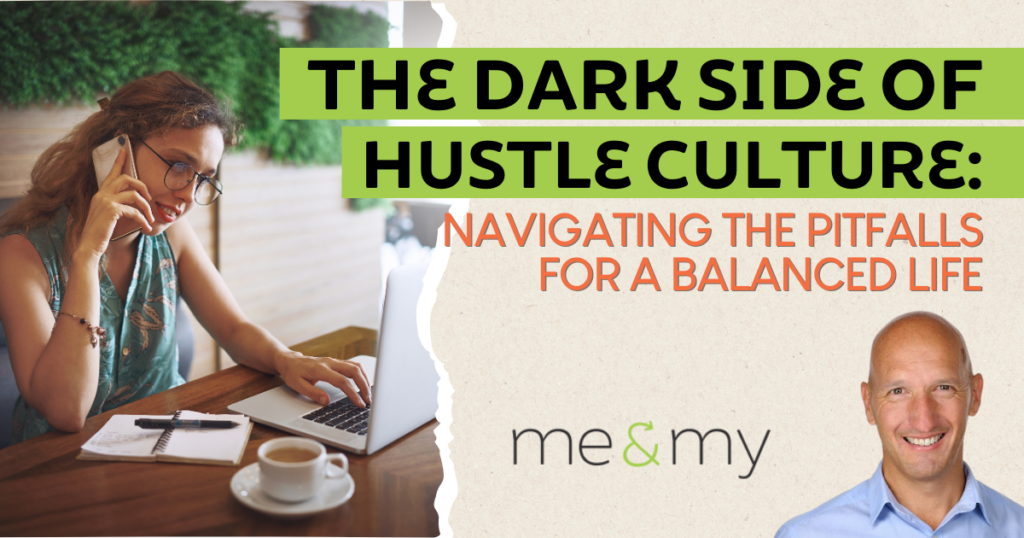The Dark Side of Hustle Culture: Navigating the Pitfalls for a Balanced Life

In an era where “hustling” is often celebrated as the ultimate badge of honour, it’s crucial to pause and reflect. Is this relentless grind truly the path to success and happiness? Or is there a hidden dark side that we’re overlooking?
Inspired by a thought-provoking episode of the me&my health up podcast, where host Anthony Hartcher was joined by guest Daniel Lawson, this blog aims to shed light on the often-glamourised hustle culture. We urge you to read till the end, as this might be the wake-up call many of us need.
Watch the full video here:
Unmasking the Dark Side of Hustle Culture: Truths You Need to Know!
What is Hustle Culture?
Hustle culture is a societal norm that emphasises ceaseless working and constant busyness as the primary path to success. It’s a culture that celebrates sleepless nights, endless work hours, and the “always-on” mentality.
In hustle culture, downtime or relaxation is often seen as laziness or lack of ambition. It’s the relentless push to achieve more, do more, and be more, often at the expense of one’s well-being.
The Illusion of Boundaries
In the age of digital connectivity, the lines between work and personal life have blurred. While technology has brought us closer, enabling instant communication and constant updates, it has also eroded the sacred boundaries that once separated our professional lives from our personal relaxation time.
Instead of a clear demarcation, we now have a mesh, where work and leisure are constantly intertwined, often leading to burnout and a lack of work-life balance.
The Great Burnout: A Stark Reality

Recent findings have shown that “The Great Burnout” has affected 50% of Australian workers, especially in the post-pandemic era. This has led to a decline in both physical and mental health. Alarmingly, one-third of prime-aged workers are even considering quitting their jobs due to the immense pressures and strains. Read more about this on 10Play.
The Three Big Lies of Hustle Culture
1. Time Scarcity
The belief that there’s never enough time is pervasive. This myth creates feelings of constant pressure, pushing us to be perpetually busy. However, it’s not about managing time—it’s about managing decisions and priorities.
2. Money as the Ultimate Goal
The idea that more hustle equals more money, which in turn solves all problems, is a dangerous one. Financial success doesn’t always equate to emotional or personal fulfilment.
3. The Toxicity of Constant Busyness
Being perpetually busy doesn’t necessarily mean being productive. It’s essential to differentiate between genuine productivity and mere busyness, which can lead to burnout and a lack of genuine fulfilment.
The Harmful Effects of Hustle Culture
- Blurred Boundaries: With the rise of digital connectivity, the lines between personal and professional lives have become increasingly intertwined, leading to burnout and a lack of work-life balance.
- Mental and Physical Strain: Constant hustling can lead to chronic stress, which has been linked to a myriad of health issues, from mental health disorders to cardiovascular diseases.
- Loss of Genuine Fulfilment: Being perpetually busy can result in a life where one is merely existing rather than truly living, leading to feelings of emptiness and lack of genuine fulfilment.
- Toxic Mindsets: Hustle culture can instil beliefs of never having enough time or money, leading to a scarcity mindset that can be detrimental to one’s overall well-being.
The Importance of Co-Regulation

Navigating the stresses of modern life requires more than just individual resilience. Co-regulation, a concept revolving around mutual support and understanding, is crucial.
It’s about helping each other manage daily stresses, ensuring that both parties thrive. By bringing our emotional levels into a harmonious state together, we can better navigate the challenges of hustle culture.
Dismissing and Avoiding the Hustle Culture

- Reframe Your Perspective on Time: Instead of viewing time as a dwindling resource, see it as an opportunity for experiences. Focus on creating meaningful moments rather than just filling hours.
- Prioritise Well-being: Recognise the importance of self-care and mental health. It’s essential to take breaks, engage in activities that bring joy, and ensure you’re not constantly in “hustle mode.”
- Set Clear Boundaries: Ensure there’s a clear demarcation between work and personal time. This can mean setting specific work hours, taking regular breaks, or even designating tech-free times.
- Challenge Societal Norms: Just because society celebrates the “always-on” mentality doesn’t mean it’s the right path for everyone. Understand what success means to you personally, rather than what it’s portrayed to be.
In Conclusion
Hustle culture, with its relentless emphasis on constant work and achievement, isn’t the golden ticket to success it’s often portrayed to be. By understanding its pitfalls and actively choosing to redefine our measures of success, we can strike a balance that prioritises well-being and genuine fulfilment. Remember, it’s not about how much you do, but the value and purpose behind what you do.
Finding Balance with me&my wellness
While understanding the dark side of hustle culture is crucial, taking proactive steps towards a balanced life is equally important. This is where holistic health coaching can make a significant difference.
At me&my wellness, we recognise that every individual’s journey is unique. Our approach isn’t just about addressing symptoms; it’s about understanding the root causes and crafting a wellness strategy tailored to your specific needs and goals.
Ready to redefine success on your terms and prioritise your well-being? Book a consultation with us and embark on a transformative journey towards genuine fulfilment and balance.

